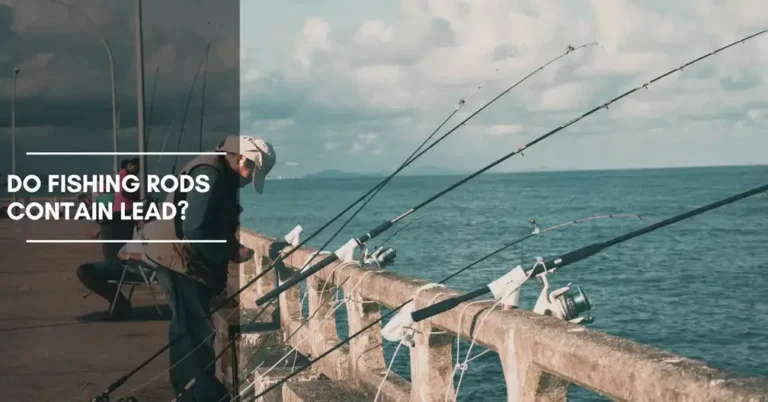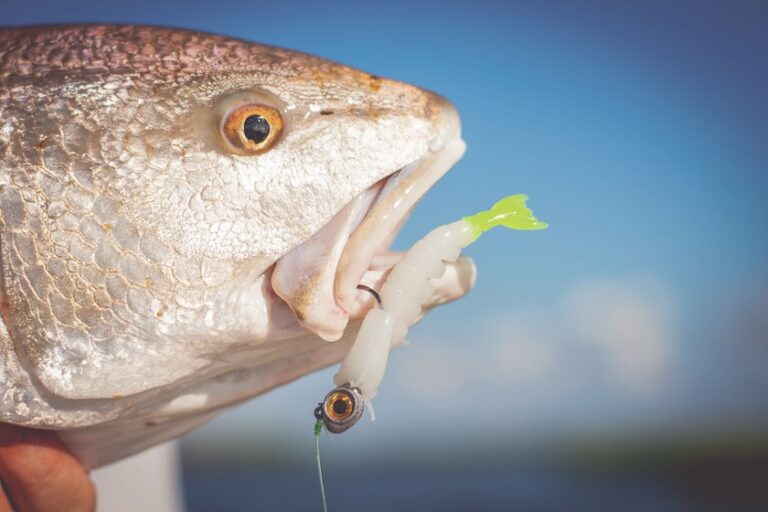To avoid sea sickness while fishing, keep your gaze fixed on the horizon and take deep breaths. Sea sickness can turn a promising fishing trip into a miserable experience.
The constant rocking of the boat, combined with the unfamiliar motions of the waves, can trigger nausea and vomiting in susceptible individuals. However, there are ways to prevent sea sickness and enjoy your time on the water. One effective method is to keep your gaze fixed on the horizon as much as possible.
This helps to stabilize your inner ear and reduce the perception of motion. Taking deep breaths and getting fresh air also helps to alleviate symptoms. Additionally, it is important to avoid heavy meals before your fishing trip and stay hydrated. By implementing these strategies, you can increase your chances of having a pleasant and nausea-free fishing experience.

Credit: goaugie.com
Understanding The Causes Of Sea Sickness
Sea sickness can turn what should be a fun day of fishing into a miserable experience. The nausea, dizziness, and general discomfort can quickly put a damper on your time out on the water. But fear not! There are steps you can take to avoid sea sickness and ensure a smooth and enjoyable fishing trip.
In this section, we will explore the causes of sea sickness, specifically focusing on the inner ear, vision, and the vestibular system.
The Inner Ear And Motion Sickness
- The inner ear, also known as the labyrinth, plays a significant role in our sense of balance.
- Motion sickness occurs when there is a conflict between the signals received by the inner ear and the visual cues the eyes see.
- When the inner ear senses motion, but the eyes do not see any corresponding movement, confusion and discomfort can arise, leading to sea sickness.
- The inner ear contains tiny, fluid-filled canals that detect changes in motion and orientation, and when these signals are inconsistent, it can result in feelings of nausea and dizziness.
Vision Plays A Role
- Vision is closely connected to our sense of balance and perception of motion.
- When your eyes see that you are on a moving boat, but the rest of your body senses stability, it can cause confusion in the brain.
- Staring at a fixed point on the boat, such as the bow or the horizon, can help synchronize the signals from your eyes and inner ear, reducing the likelihood of sea sickness.
- Avoid focusing on nearby objects or constantly shifting your gaze, as this can increase the disconnect between what your eyes perceive and what your inner ear senses.
The Role Of The Vestibular System
- The vestibular system, located within the inner ear, is responsible for detecting head movements and changes in position.
- It plays a crucial role in maintaining our body’s equilibrium and spatial orientation.
- When the vestibular system receives conflicting signals from the inner ear and vision, it can trigger symptoms of sea sickness.
- Certain individuals may have a more sensitive vestibular system, making them more prone to experiencing sea sickness.
Understanding the causes of sea sickness, such as the inner ear, vision, and the vestibular system, is crucial in finding ways to prevent and alleviate these unpleasant symptoms. By taking steps to maintain a stable visual focus, focusing on a fixed point, and avoiding activities that may disrupt the signals from your inner ear and vision, you can greatly reduce the likelihood of sea sickness while fishing.
So, gear up, head out to the water, and enjoy your fishing adventure without the discomfort of sea sickness!
Preparing For A Seasickness-Free Fishing Trip
**preparing for a seasickness-free fishing trip**
Fishing is an exciting and rewarding activity, but for some people, the motion of the ocean can lead to an unpleasant experience known as seasickness. However, with a little preparation, you can minimize the chances of getting seasick and enjoy your fishing trip to the fullest.
Here are some key steps to follow in order to have a seasickness-free experience:
Choosing The Right Fishing Boat
When it comes to fishing boats, there are various options available. To avoid feeling queasy on the water, it’s important to choose the right boat that suits your needs. Consider the following:
- Opt for a boat with a stabilizing feature or design, such as a deep-v hull, which provides better stability and minimizes rocking motion.
- When booking a fishing charter, inquire about the boat type and its stability on the water.
- Smaller boats tend to sway more in rough waters, so if you’re prone to seasickness, consider going for a larger and more stable vessel.
Packing Essential Seasickness Remedies
Being prepared with the right seasickness remedies can make a significant difference in your comfort level during the fishing trip. Here’s a list of essential items to pack:
- Over-the-counter seasickness medications such as dramamine or bonine can help prevent and alleviate symptoms. Consult your doctor for guidance on which medication is best for you.
- Sea bands or acupressure bracelets, which apply pressure to specific points on the wrist to help relieve nausea and dizziness.
- Ginger candy or ginger capsules, known for their natural anti-nausea properties, can provide relief without any side effects.
- Peppermint essential oil or chewing gum can have a soothing effect on your stomach and alleviate queasiness.
Eating The Right Foods Before The Trip
What you eat before your fishing trip can greatly impact your susceptibility to seasickness. Here are some tips for pre-trip meals:
- Stick to light meals that are easily digestible and won’t upset your stomach.
- Avoid greasy and heavy foods, as they can contribute to feelings of nausea.
- Opt for foods rich in vitamin b6, such as bananas and whole grains, as they have been known to help reduce symptoms of seasickness.
- Stay hydrated by drinking plenty of water, as dehydration can worsen feelings of dizziness and queasiness.
Remember, prevention is key when it comes to avoiding seasickness. By choosing the right boat, packing essential remedies, and eating the right foods, you can increase your chances of having a pleasant and seasickness-free fishing trip. So get out there, cast your line, and enjoy the beauty of the ocean without any worries!
Proven Techniques To Prevent Sea Sickness While Fishing
**proven techniques to prevent sea sickness while fishing**
Are you planning a fishing trip but worried about getting sea sick? Don’t let the fear of motion sickness ruin your day on the water. There are several proven techniques you can use to prevent sea sickness and enjoy your fishing adventure to the fullest.
In this section, we will discuss three effective strategies that will help you keep sea sickness at bay.
Keeping Your Eyes On The Horizon
One of the main causes of sea sickness is conflicting signals to your brain from your inner ear and eyes. By focusing on the horizon, you can help your brain reconcile these signals and prevent the onset of nausea. Here are some tips to help you keep your eyes on the horizon:
- Find a stable position on the boat where you have a clear view of the horizon.
- Avoid looking down or staring at objects in the boat, as this can exacerbate motion sickness.
- If possible, stand or sit facing forward so that you have a clear sight of the horizon at all times.
- Use sunglasses to reduce glare and improve your ability to focus on the distant horizon.
Focusing On Distant Objects
In addition to keeping your eyes on the horizon, focusing on distant objects can further alleviate sea sickness symptoms. By directing your gaze towards objects in the distance, you can help your brain recalibrate and reduce the sensation of motion.
Consider the following tips for focusing on distant objects:
- Look for stationary landmarks such as distant islands, buoys, or shoreline features.
- Avoid fixating on nearby moving objects like other boats or fishing gear.
- Scan the surroundings regularly and shift your gaze between various distant objects.
- Engage in conversation with fellow anglers or distract yourself with enjoyable activities to divert your attention from the motion.
Practicing Deep Breathing And Relaxation Techniques
Engaging in deep breathing and relaxation techniques can help calm your nervous system, reducing the likelihood of sea sickness. By focusing on your breath and freeing your mind from stress, you can create a sense of calm and combat nausea.
Here are a few deep breathing and relaxation techniques to practice:
- Take slow, deep breaths through your nose, allowing your abdomen to rise and fall with each breath.
- Exhale slowly through your mouth, releasing any tension or stress from your body.
- Try progressive muscle relaxation by tensing and then releasing one muscle group at a time, starting from your toes and working up to your head.
- Listen to soothing music or use guided meditation apps to help you relax while on the boat.
Remember, prevention is key when it comes to sea sickness. By keeping your eyes on the horizon, focusing on distant objects, and practicing deep breathing and relaxation techniques, you can significantly reduce the chances of feeling queasy during your fishing trip.
So, don’t let sea sickness hold you back – embrace these proven techniques and enjoy your time on the water!
Conclusion
Avoiding sea sickness while fishing is crucial to ensure an enjoyable and productive fishing experience. By following these simple and effective techniques, such as staying hydrated, choosing the right location, maintaining a stable center of gravity, and using natural remedies, you can significantly reduce the risk of sea sickness.
It’s important to remember that prevention is key, so take the necessary precautions before setting sail. Whether you’re an experienced angler or a beginner, understanding and addressing the causes of sea sickness is essential to make the most of your time on the water.
So, next time you plan a fishing trip, implement these strategies and enjoy a smooth and nausea-free adventure. Don’t let sea sickness dampen your spirits or stop you from reeling in that big catch – take control and enjoy the wonderful world of fishing without any ill effects.





